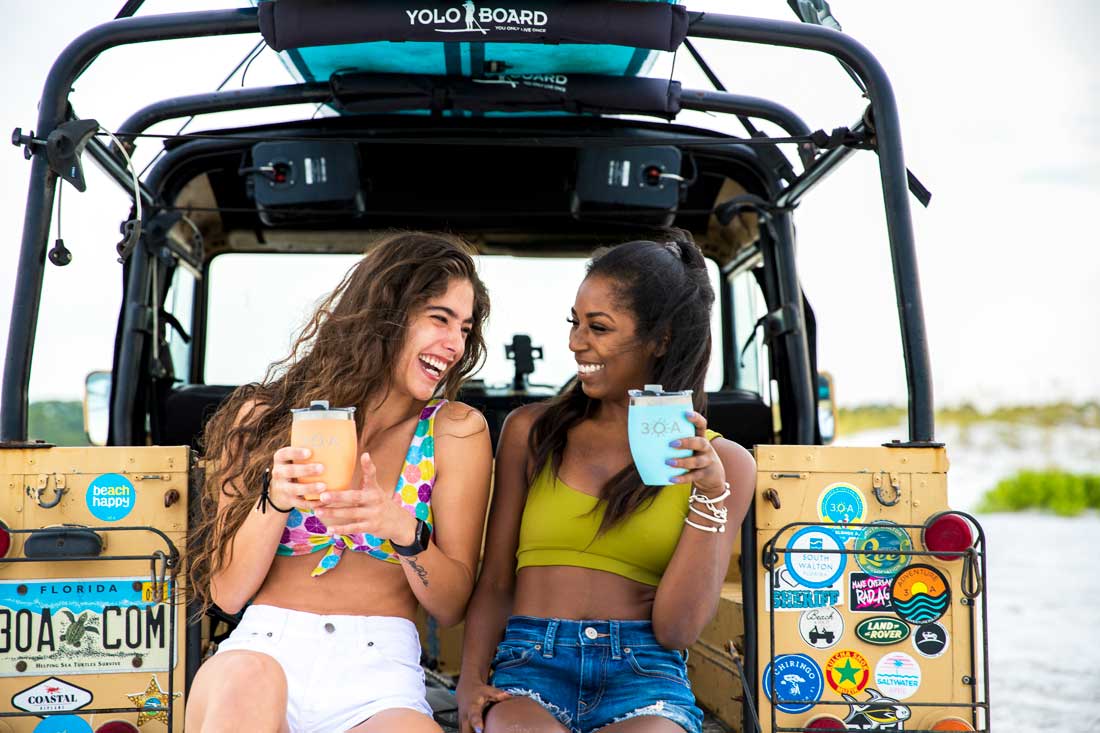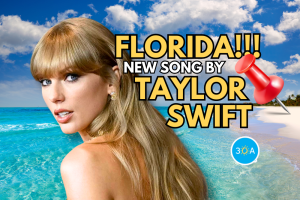


The 30A Company recently commissioned an academic research study to examine the relationships between the beach, travel, and happiness.
Are you searching for happiness? If so, you’re not alone.
A new study conducted by the University of Alabama’s Public Opinion Lab revealed, among other things, that people are significantly happier when anticipating or planning their next vacation getaway.
The College of Communication and Information Sciences (C&IS) recently featured the research findings in Communicator magazine. You can read the full story here.
Beach Happy® magazine and 30A.com founder Mike Ragsdale understands the pursuit of happiness. Years ago, Mike and his growing family lived a suburban lifestyle similar to thousands of others in and around Birmingham, Alabama. The family, and Mike, in particular, spoke so often about living a beach lifestyle that one day their daughter challenged her parents to not just talk about their dreams but to act on them. The Ragsdale family did just that and abruptly moved to Florida’s Emerald Coast, where Mike created the 30A® brand based on the small-town lifestyle his family enjoyed along Scenic Highway 30A.
In Mike’s never-ending quest to unlock the secrets to happiness, 30A recently commissioned an academic research study designed to better understand how our personal happiness is influenced by factors such as travel and living a beach lifestyle.
The research found that a major common denominator of happiness involves our perception of past and future vacations.
Jay Waters is a Senior Instructor at the University of Alabama College of Communications and Information Sciences in Tuscaloosa, Alabama, and Dr. Jameson Hayes is an Associate Professor and Director of the university’s Public Opinion Lab.
Working together, these two communication experts surveyed 1,040 random U.S. adults between the ages of 25 – 55 to determine people’s level of happiness and how it is influenced by beaches and travel.
People over the age of 55 were excluded from the study, to reduce the impact of retirement on the happiness data.
According to a statistically significant percentage of respondents, just dreaming about planning a trip to your favorite destination can send your “happy meter” soaring.
“The results from this survey somewhat surprised us, but positively,” noted Dr. Hayes. “We also learned that enduring reminders of past vacations like bumper stickers, mobile ringtones, workplace mementos, and artwork can increase happiness levels. And people who are planning upcoming trips are happier than those who aren’t.”
Some people crave a quiet getaway in the mountains, with the closest neighbor miles away. Another group wants to lay in a canvas beach chair for hours while sipping on a Bushwacker between chapters of a steamy novel, broken only by the gentle sound of crashing waves. Others crave the hustle and bustle of a major metropolis.
The research found that living a beach lifestyle isn’t everyone’s preferred cup of tea. Retrieving your snow skis from the attic in anticipation of a six-inch snowfall or exploring endless miles of nature trails in one of America’s gorgeous national parks also raises some people’s “happy level.”
Respondents in the study noted their level of happiness increased as they thought about their next vacation, regardless of the destination type.
“It doesn’t matter what type of vacation they’re planning,” said Dr. Hayes. “Planning any vacation increases happiness.”
There’s no question that America’s recent pandemic impacted people’s travel habits. Some took the term “working remotely” literally, temporarily relocating to a favorite destination. Pre-pandemic, 58 percent of respondents said they spent less than five days on vacation per year. Medium travelers, venturing away from 6 to 14 nights, comprised 29 percent, while heavy travelers (15 days of annual vacation or more) made up 13 percent of all respondents.
With pandemic and travel restrictions now easing in most parts of the country, the percentage of light travelers decreased significantly, down to 44 percent. Interestingly, post-pandemic medium travelers spiked to 43 percent, meaning more people plan on spending between one and two weeks annually visiting their favorite destinations once the pandemic wanes.
Beaches are the most preferred vacation destination by 34.2 percent of respondents, with mountain vacations second at just under 20 percent.
When examining whether or not a specific type of vacation affected happiness, practically every destination generated a positive response. For example, 93.8 percent of those surveyed indicated that a nature-centric vacation generated moderate to happy emotions. Mountain and beach vacations were virtually even, at 92.3 and 92.2 percent respectively, with theme park and cruise trips at 90.4 percent. Trips to a large city came in at 88 percent.
Let’s face it — moderate happiness isn’t the end goal for most people. Experiencing a euphoric rush of hair-raising dopamine excites most of us. When removing “moderate” happiness levels, mountain trips top the list with a 50 percent happiness rating. Theme park visits come in at 45 percent, followed closely by beach trips at slightly under 43 percent.
People who reflect on past vacations reported increased happiness levels by keeping a handful of reminders around their homes and workplace. The amount and type of vacation reminders also impacted the “happiness levels” of respondents.
Surrounding ourselves with a few reminders of past trips keeps our happy juices flowing. For example, stickers (such as the round, blue 30A stickers), downloaded ringtones (think Jimmy Buffett’s “Margaritaville”), branded clothing items such as caps and shirts, or picture frames and keychains, all play a role in reminding people about their favorite vacations, and therefore increasing their level of happiness.
But the anticipation of a trip, whether an extended weekend getaway or a vacation of five or more days, seems to make people experience a heightened sense of happiness. Think about how your friend’s eyes light up as they describe in vivid detail the AirBnB they snagged or how lucky they were to secure a tee time at an exclusive golf resort that lies along the Pacific coastline.
30A’s inaugural Beach Happy study unpacked a lot of data. Waters and Hayes hope to expand on their results next year by revising the questions to dig deeper into how and why people feel happier when thinking about travel and future destinations.
But ultimately, action is an essential key to unlocking happiness.
“Reminders of past vacations do help increase happiness, but we found that anticipation trumps nostalgia, so looking forward to a trip seems to evoke more positive emotions than reminiscing over your last vacation,” said Waters.
“If you want to be happier, book a trip.”
• Beach vacations are the most popular vacation type regardless of how much one travels.
• Having 2-3 vacation mementos around your work or home makes you happier. Not having vacation mementos makes one less happy.
• Technology is an essential way respondents engage with their favorite vacation destinations. Every week, 50% of respondents read social media posts that reminded them of their favorite vacation destination. Following a destination on social media, adding it to their weather app, and having a destination wallpaper on their phone or computer were the most commonly used reminders.
• The more you travel, the happier you are. The happiest respondents traveled 15-21 days per year. But happiness appears to have its limits: Happiness levels drop off after 21 days of vacation travel.
• Ultimately, to be happier, book a trip! Having a vacation to look forward to makes you a happier person.
Please direct media inquiries to 30A’s Marketing Coordinator.

Inspired by small-town life along Florida’s Gulf Coast, 30A® shares BEACH HAPPY® stories and eco-conscious products with millions of fans worldwide. 30A has 1.5 million social media followers, has raised $2.8 million for coastal charities, and has given away 3 million of its world-famous blue 30A stickers. Available in 380 stores nationwide, 30A apparel is made from recycled plastic bottles, preventing 6 million water bottles from going into our landfills and oceans so far. To learn more, visit www.30A.com.




